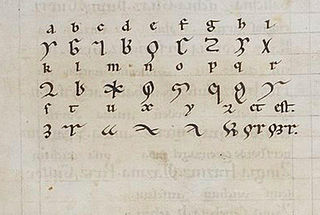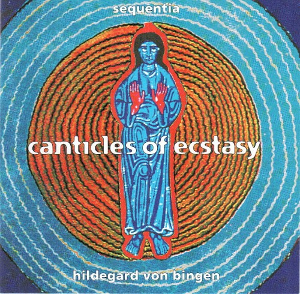Related Research Articles

Hildegard of Bingen, also known as Saint Hildegard and the Sibyl of the Rhine, was a German Benedictine abbess and polymath active as a writer, composer, philosopher, mystic, visionary, and as a medical writer and practitioner during the High Middle Ages. She is one of the best-known composers of sacred monophony, as well as the most recorded in modern history. She has been considered by a number of scholars to be the founder of scientific natural history in Germany.
Timothy James "Matthew " Fox is an American priest and theologian. Formerly a member of the Dominican Order within the Catholic Church, he became a member of the Episcopal Church following his expulsion from the order in 1993.
Benjamin Bagby is an American singer, composer, harpist, and performer of medieval music.
Viriditas is a word meaning vitality, fecundity, lushness, verdure, or growth. It is particularly associated with abbess Hildegard von Bingen, who used it to refer to or symbolize spiritual and physical health, often as a reflection of the Divine Word or as an aspect of the divine nature.

A lingua ignota was described by the 12th-century abbess Hildegard of Bingen, who apparently used it for mystical purposes. It consists of vocabulary with no known grammar; the only known text is individual words embedded in Latin. To write it, Hildegard used an alphabet of 23 letters denominated litterae ignotae.

The University of Winchester is a public research university based in the city of Winchester, Hampshire, England. The university has origins tracing back to 1840 as a teacher training college, but was established in 2005.

Eibingen Abbey is a community of Benedictine nuns in Eibingen near Rüdesheim in Hesse, Germany. Founded by Hildegard of Bingen in 1165, it was dissolved in 1804, but restored, with new buildings, in 1904. The nuns produce wine and crafts. They sing regular services, which have been at times recorded. The church is also used as a concert venue. The abbey is a Rhine Gorge World Heritage Site.
Ordo Virtutum is an allegorical morality play, or sacred music drama, by Hildegard of Bingen, composed around 1151, during the construction and relocation of her Abbey at Rupertsberg. It is the earliest morality play by more than a century, and the only medieval musical drama to survive with an attribution for both text and music.

David Hill, is a choral conductor and organist. Since July 2013, he is Professor Adjunct of Choral Conducting and Principal Conductor of Yale Schola Cantorum at the Yale Institute of Sacred Music. His highest-profile roles are as Chief Conductor of the BBC Singers from September 2007 until 2017, and Musical Director of The Bach Choir since April 1998.

Saint Bertha of Bingen was the mother of Rupert of Bingen. Her biography was written, and subsequently her cult popularized, by Hildegard of Bingen, who lived in the same region, about four hundred years later. Bertha and Rupert share a feast day on 15 May.

Scivias is an illustrated work by Hildegard von Bingen, completed in 1151 or 1152, describing 26 religious visions she experienced. It is the first of three works that she wrote describing her visions, the others being Liber vitae meritorum and De operatione Dei. The title comes from the Latin phrase Sci vias Domini. The book is illustrated by 35 miniature illustrations, more than that are included in her two later books of visions.
Stephen David Layton is an English conductor.

Linda Jane Pauline Woodhead is a British sociologist of religion and scholar of religious studies at King's College London Faculty of Arts and Humanities. She is best known for her work on religious change since the 1980s, and for initiating public debates about faith. She has been described by Matthew Taylor, head of the Royal Society of Arts, as "one of the world's leading experts on religion".
This is a bibliography of Hildegard of Bingen's works.

This is a discography of Hildegard of Bingen's musical works.
Columba Aspexit is a sequence written by Hildegard of Bingen in the late 12th century. It is one of seven sequences from her collection of lyrical poetry entitled Symphonia armonie celestium revelationum. This piece is found in only one manuscript: HS 2; Hessische Landesbibliotek, Wiesbaden, "Riesenkodex" (1175).

Canticles of Ecstasy is an album of sacred vocal music written in the 12th century by the German abbess Hildegard of Bingen and recorded by the early music ensemble Sequentia that was released by the Deutsche Harmonia Mundi recording label in 1993.
Barbara Jane Newman is an American medievalist, literary critic, religious historian, and author. She is Professor of English and Religion, and John Evans Professor of Latin, at Northwestern University. Newman was elected in 2017 to the American Philosophical Society.

Barbara Stühlmeyer OblOSB is a German theologian, musicologist, author, especially a Hildegard scholar and a science journalism.
Victoria Sweet is an American physician, author and advocate for what is termed "slow medicine". She is also a historian of medicine who has studied the writings of Hildegard of Bingen, a 12th century German abbess and medical therapist.
References
- 1 2 "Abstracts / June Boyce-Tillman - Biographical Statement". Faith, Spirituality and Social Change Conference. University of Winchester. 8 April 2006. Archived from the original on 9 July 2007.
- ↑ "June Barbara Boyce-Tillman" . Crockford's Clerical Directory (online ed.). Church House Publishing . Retrieved 17 October 2016.
- ↑ "The Reverend Professor June Boyce-Tillman". University of Winchester. Archived from the original on 19 July 2011.
- ↑ "No. 58729". The London Gazette (Supplement). 14 June 2008. p. 23.